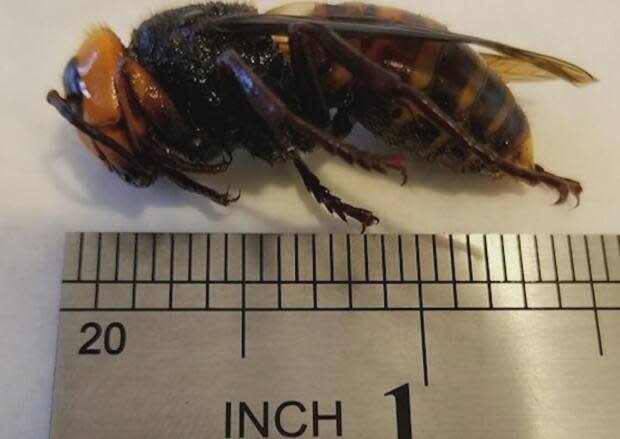Asian giant hornet could spread quickly in B.C., says study
A new study says a large invasive hornet could spread throughout western North America unless coordinated mitigation efforts are implemented.
The Asian giant hornet, or Vespa mandarinia, is part of the same order of insects as bees, but can grow up to five centimetres long.
The apex predators prey on all kinds of insects, including honey bees, and can quickly decimate colonies. Their natural range includes much of Japan, the Korean peninsula, and coastal China.
While the hornets can inflict a painful sting on humans who get too close, they are most feared for their potential to harm local bee populations.
Some Asian giant hornets turned up in the province and in Washington state in the fall of 2019. Another was found in Langley this spring.

The new study was published last month in the scientific journal Proceedings of the National Academy of Sciences of the United States (PNAS).
It said the insect "could rapidly expand its invasive range throughout western North America absent coordinated mitigation efforts."
The study specifies that even under a worst-case scenario of rapid distribution, the hornet would remain confined to the coastal areas of B.C., Washington state and Oregon, where there are high levels of precipitation and temperatures are moderate.
Skepticism
Paul van Westendorp, B.C.'s provincial apiculturist, is skeptical of the study's assumptions.
He said the the methodology of the study relied in part on the distribution of another invasive species of hornet in Europe, Vespa velutina.
"This is a totally different species," explained van Westendorp. "Its behaviour both in nesting and its predation behaviour is very different," he said, meaning it may not apply to how the Asian hornet behaves in B.C.
He said though that due to comparable climate between its natural habitat and parts of B.C., the insect could establish itself here.
Gail Wallin, director of the Invasive Species Council of B.C., said global warming and climate change could favour the insect.
"The concern always is with a warming climate with less severe winters, can we get it established here?" she said.
Van Westendorp is curious to see whether the insect will be able to thrive in the evergreen forests of British Columbia and Washington, considering the forests in its natural range are predominantly deciduous.
"By virtue of that, it has a very different undergrowth and as a consequence to that it will also have a different prey format in its natural distribution area compared to what it has here," he explained.
The most at-risk areas of the province for the hornet, according to van Westendorp, are the western part of the Fraser Valley and the Nanaimo and Cowichan Valley area on Vancouver Island.
Van Westendorp says those areas are being watched closely, traps have been set and surveillance will continue until at least 2022.
Authorities are asking anyone who sees an Asian hornet to report it to the Invasive Species Council of B.C.

